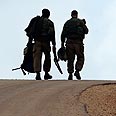
Soldiers to recieve compensation
צילום: רויטרס
Exonerated soldiers to receive compensation
IDF combatants who were exonerated of aggravated assault against Palestinian police officer to receive NIS 24,000 compensation after appeals court decides case had serious flaws
The IDF will compensate combatants who were exonerated of charges of assault against a Palestinian police officer.
A military appeals court in the Kirya base in Tel Aviv ruled this week that the military would compensate two troops in the Netzah Yehuda haredi battalion with a total sum of NIS 24,000 ($5,980) who were falsely accused of assaulting a Palestinian police officer in 2008.
Related stories:
- New recruits join haredi battalion
- An insider's guide to IDF's haredi regiment
- Former haredi troops demand to report for reserve duty
At first, the Military District Court in Jaffa rejected the compensation claim filed by the soldiers after the two were acquitted and the indictment against them was cancelled, but the appeal was accepted and each of the soldiers is set to receive half of the total compensation sum.
The two, now civilians, decided to demand compensation from the IDF after they were incarcerated in military prison for nearly two months after the launch of the investigation against them and their subsequent indictment.
The two were accused of aggravated assault and if convicted they faced a long sentence in military prison. They were also accused of conduct unbecoming due to claims that they assaulted the Palestinian police officer when they were on duty at the Bekaot checkpoint.
Following a disciplinary hearing the two were sent to prison, but at the same time, Investigating Military Police decided to open a criminal case against the soldiers. The two first admitted to the charges but later claimed the confessions were extracted after their commanders threatened and pressured them to confess.
The Palestinian police officer who filed the original complaint testified during the trial that the two soldiers were "unquestionably and resolvedly" not the two that assaulted him. Yet in spite of his testimony, the military prosecution chose to go ahead with the indictment.
Ultimately the charges were dropped by the deputy Military Advocate General. The soldiers claimed during the trial that saw them exonerated that "we were severely hurt (by the case), our reputation and liberty and the fact that we were suspended from our duties as combat soldiers."
Meanwhile, the prosecution claimed that "in spite of the damages sustained by the soldiers, the law does not obligate compensation for every acquittal. It is not within the public interest to discourage the prosecution.
"The defense's claims that the investigation could have occurred before the indictment was filed are like being knowledgable after the fact. And there was additional evidence, such as the soldiers' confessions and their colleagues' testimonies.
In the ruling the judges determined that "the prosecution had enough evidence to reasonably justify an indictment," that said, they added that "several inadequacies that could have been prevented occurred in the case.
"The disciplinary hearing lacked competence and the investigation had many serious flaws including a lack off identification of the two soldiers by the complainant…a line up could have prevented an indictment."
- Receive Ynetnews updates directly to your desktop










